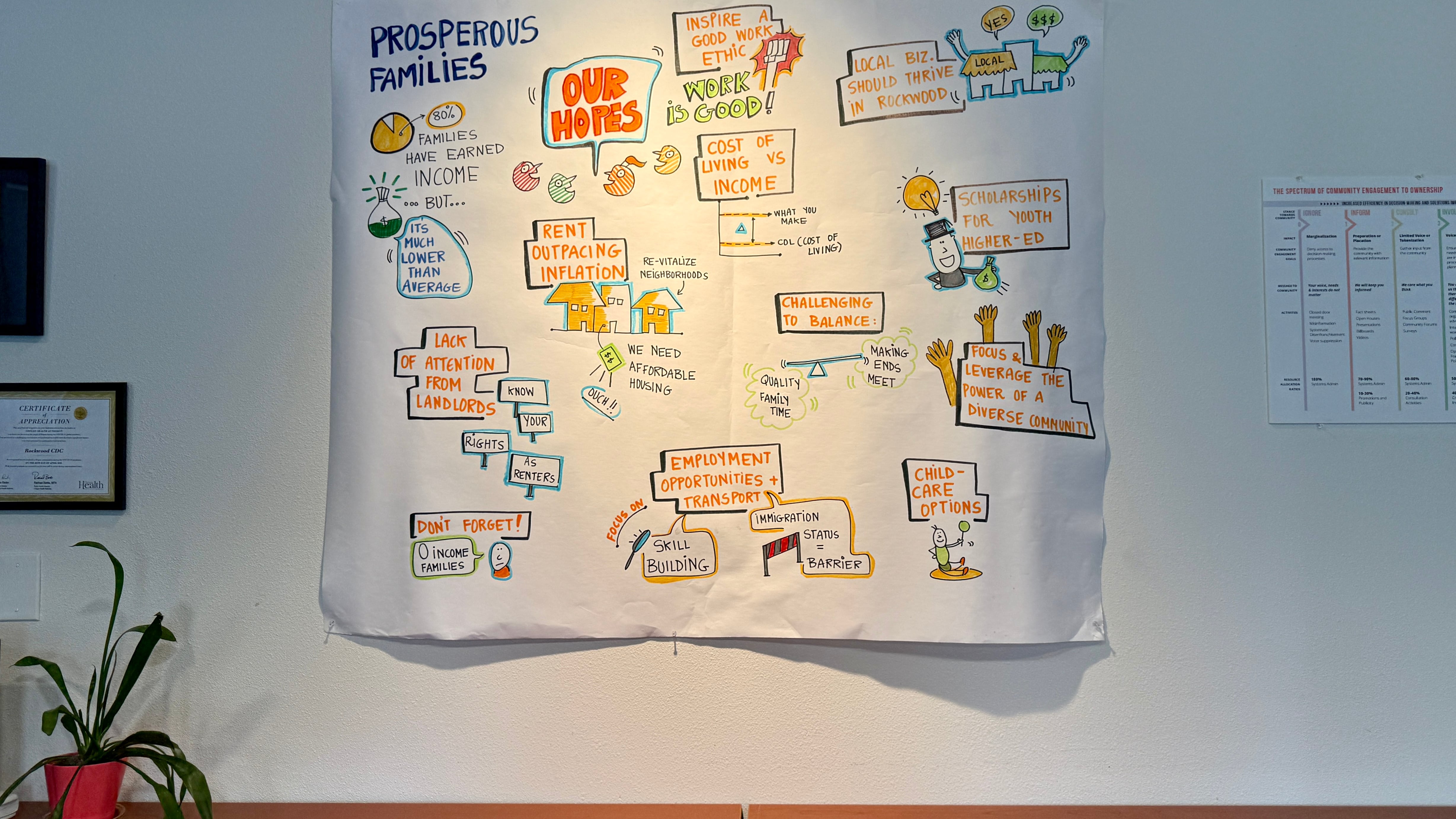Liana Hernandez has grim memories of her family’s eight-month stay at Rockwood Tower, the motel-turned-shelter that a former technology executive bought with $6.8 million of taxpayer money in 2021 after reinventing himself as a social service provider.
Breakfast was one packet of instant oatmeal, she says. Lunch was Cup Noodles, and dinner was a Banquet brand frozen TV dinner ($1.68 at Walmart). That was the menu every day.
“Once in a blue moon, we got a corn dog,” Hernandez says.
Two other former residents confirmed the menu. At one point, a community health worker at Rockwood Tower suggested contracting with Stone Soup PDX, a nonprofit that delivers scratch-made meals to people in need.
The price tag would have been $40,000 for six meals a week for about 140 people, according to a former employee who declined to be named for fear of retaliation. Stone Soup development director Christina Putterman says the bid was $33,840. Management didn’t go for it.
“People in jail eat better,” the former employee said.
In June, a colleague who remained at Rockwood Tower texted the employee, telling her about a staff retreat to Lincoln City on the Oregon Coast.
“It’s mostly to spend down budget before the end of the fiscal year, but who am I to turn down a free oceanfront room, you know?” the colleague wrote in a message obtained by WW.
News of the trip struck the former employee, she says, because Rockwood Tower managers had been unwilling to pay for Stone Soup PDX. Nor had they been willing to buy more coin-operated washers and dryers, forcing 40 families to make do with just two of each, according to one former employee and two former tenants.
In response to questions from WW, Ketch says staff went to the coast to visit another hotel-turned-shelter funded by the state. Residents are reimbursed for laundry expenses, he says. And it was Rockwood Tower’s development director who suggested Stone Soup, but “it was out of our budget for long-term use,” Ketch says.
The cheap food and poor facilities don’t match promises made by Ketch to the people of Rockwood, the struggling Gresham neighborhood he says he’s trying to help. Long accustomed to positive press, Ketch made news in June when Multnomah County said it would no longer pay to house 50 families at Rockwood Tower because he had charged the county for empty rooms and double-charged for related services. The frozen meals were another concern, a county spokesperson says.
In previous WW stories, Ketch has countered that it was he who severed ties because the county was late in paying him more than $1 million.

Ketch, who once ran a computer networking company that burned through more than $50 million of investors’ cash, has built a personal brand on his role as the savior of Rockwood, calling it “my own Calcutta,” in The Flourishing Community: A Story of Hope for America’s Distressed Places, a 2023 book he wrote about his work in Rockwood.
In 2013, Ketch and his wife founded the Community Development Corporation of Oregon, a nonprofit that does business as the Rockwood Community Development Corporation and sits at the center of a web of limited liability companies and programs, including East County Housing LLC, which owns Rockwood Tower, and the Shalom Rockwood Network, which “works with faith communities and worships together for the benefit of Rockwood,” according to its website.
East County Community Health, another Ketch venture, connects “underserved residents of East Multnomah County to information, services, providers, and health practitioners,” according to its website.
Rockwood Tower is almost certainly the most valuable asset in Ketch’s constellation of nonprofits. The four-story building accounts for about half of all the family shelter space in Multnomah County, with 65 large rooms, each furnished with two sets of bunk beds so that a family can stay together.
Ketch, who earned a bachelor’s degree in economics and business from Wheaton College, an evangelical school in Illinois, and an MBA from Northwestern University, is good at getting Rockwood on policymakers’ radar. In August 2022, he held a “convergence of local, regional and national leaders” attended by U.S. Sens. Jeff Merkley and Ron Wyden (D-Ore.), Oregon Gov. Kate Brown, and Gresham Mayor Travis Stovall.
Vince Jones-Dixon, a former Gresham city councilor, name-checked Ketch when he was sworn in as a Multnomah County commissioner in January. Ketch “calls us a community that has a ton of social capital,” Jones-Dixon said. Ketch had given Jones-Dixon $568 for the 2024 race, the maximum allowed.
Ketch is also adept at raising money, and a nonprofit community development corporation is a good vehicle because, through it, a social service provider can apply for myriad categories of grants. In addition to the $6.8 million in state money that Ketch got from Project Turnkey to buy an old Best Western motel on Northeast 181st Avenue and turn it into a family shelter, his Rockwood CDC got an unspecified share of $300 million that the U.S. Department of Agriculture gave to 50 projects aimed at providing farmland to “underserved producers” in July 2023. Rockwood said it would use the money to buy acreage it had been renting for refugee and immigrant farmers. It never bought the land because the Trump administration froze the funds, Ketch says.
Rockwood CDC also partnered with the U.S. Small Business Administration to launch the East County Business Bridge, a nonprofit that works with community partners “to stimulate entrepreneurship.” It hasn’t held a meeting since June 2024, its website shows.
Former residents of the 65-room Rockwood Tower say Ketch should narrow his focus. Denise Job-Williams, who lived in the tower for eight months last year, said she and her family spent much of the first three days at the tower running into the parking lot because heavy rain had leaked through the roof, causing the fire alarms to go off.
Food was the biggest problem, Job-Williams says. Residents could have microwaves in their rooms, but nothing else. Air fryers were forbidden. There was a kitchen downstairs, but around June 2024, Rockwood Tower added refrigerators but took out the stoves, she says.
Doing laundry was a challenge, too, Job-Williams, 45, says. One load in the washer cost $1.50. Same for the dryer. But even when they were running, the dryers would take three cycles to get anything dry. With just two dryers, users would be in line for hours. “You would wait half the day and into the night,” Job-Williams says.
On a tour of Rockwood Tower in June, Ketch showed off the swimming pool, brimming with clear water, just as it did when the building was a Best Western. But former tenants interviewed by WW say their families were never allowed to use it. Ketch confirmed it was closed after the YMCA halted a program offering free swim lessons there because of liability.
Four former residents complained about the staff at Rockwood Tower. Until December, employees of Greater New Hope Family Services, a company that provides counseling and shelter, worked at the front desk and handled housekeeping.
Megan Gerou, 49, who lived in the shelter last year with her husband and two adult children, said staff members were rude. Her husband is a scrapper, collecting metal and selling it to recycling companies. Staff belittled him for the work, Gerou says.
“The staff would tell him, ‘That’s not a real job,’ while everyone else was up in their rooms smoking fetty,” Gerou says. “You have to treat your participants like they are human.”
Greater New Hope didn’t return a phone message or email.
Gerou knows something about shelters. She worked for Transition Projects from 2017 to 2021, where, she says, the food was better because it was donated or cooked from scratch. One shelter improvised by having five Crock-Pots. Gerou often made pizza and brought it in.
Despite losing Multnomah County as its anchor tenant in Rockwood Tower, Ketch is looking to expand. Plans submitted to the city of Gresham show that East County Housing, the entity that owns the shelter, is in the midst of combining four lots it owns in Rockwood and developing a four-story, 56-unit apartment building called Ash & Pine. East County used the tower as collateral for a $2.4 million loan in January. Some of that money is being used “to fill gaps in the pre-development of Ash & Pine,” spokeswoman Savannah Carreno said in an email.
In documents filed with Gresham city planners, East County Housing says the project will be affordable housing. But, so far, the nonprofit hasn’t sought any land use benefits from that designation.
“The land in question is not specifically zoned for affordable housing, so the development could potentially be used for market-rate apartments,” Gresham spokesman Nate Jones said in an email. “Submitted documents have referred to this development proposal as an affordable housing project, though nothing in the city’s code would require it be used for this purpose.”
Ketch says East County Housing is seeking state financing, so it will have to “sign an affordability covenant closer to permit time.” All of the units, he says, will be affordable.
(Correction: An earlier version of this story said that Greater New Hope Family Services was a nonprofit organization. It is a domestic limited liability company registered in Oregon that is not designated as a nonprofit by the Internal Revenue Service. Willamette Week regrets the error.)

